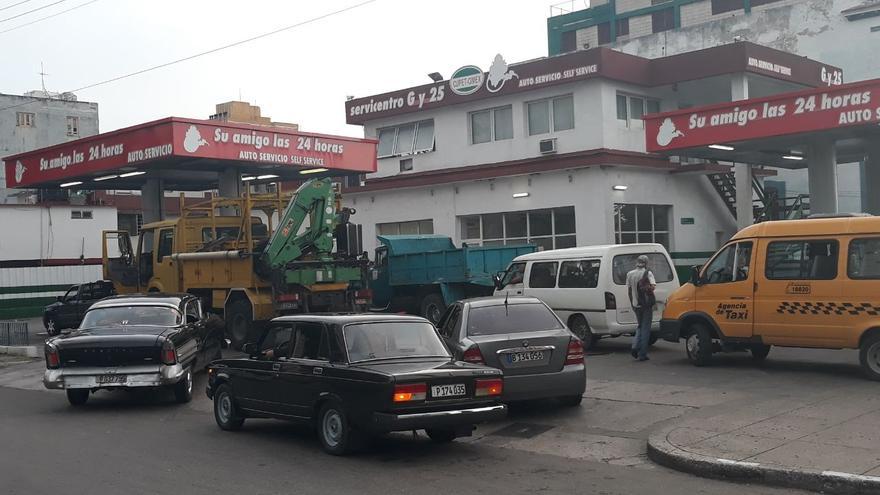
![]() 14ymedio, Havana, 20 July 2019 — After days of complaints on social networks and long lines at gas stations, this Friday Tomás Pérez Álvarez, the marketing director of the state oil company, Cupet, said in Havana on the television news that one of the causes of the deficit of gasoline is the “large number of vehicles circulating” in the country.
14ymedio, Havana, 20 July 2019 — After days of complaints on social networks and long lines at gas stations, this Friday Tomás Pérez Álvarez, the marketing director of the state oil company, Cupet, said in Havana on the television news that one of the causes of the deficit of gasoline is the “large number of vehicles circulating” in the country.
The shortage, which has caused lines hundreds of yards long in several gas stations in the Cuban capital, has affected gasoline D-90 and B-94, known as “regular” and “special”, said the official. The sale of the first will be restored tomorrow Saturday “in the afternoon,” he said, while the offer of special gasoline “should be resolved on Monday or in the early hours of Tuesday.”
“In the case of B-90, we are at this moment, as part of the logistics that has been structured to respond to this situation, bringing tanks of support from other provinces,” he added. The official did not make any reference to problems with the importation of crude, nor, to any, technical difficulties in the four refineries of the country.
“Consumption is 20% above previous stages, even 10% more than the previous summer”, added Pérez, who blames the increase on the fact that “the country has made an extraordinary effort, especially with regards to taxis, and all this results in a greater consumption of these two types of gasoline.”
As of May, there are 24 minibus routes in the capital with a capacity of 12 passengers, using Russian made vehicles. In January, 450 of these vehicles entered the country, and with them the authorities seek to alleviate the serious problems of public transport.
However, the greater presence of these vehicles in the streets of Havana has also coincided with a decrease in the number of cars operating in the private service of fixed-route shared taxis, known as almendrones*, due to a package of new regulations that came into force in December 2018 and that has caused dismay among self-employed drivers providing this service.
This Thursday, 14ymedio reported long queues in the service centers of Havana. Just two days earlier, the Minister of Energy and Mines, Raúl García, had denied on Cuban television any problem with the supply of fuel to the energy sector as a cause of the blackouts that the island has experienced in the last week.
The long line for gasoline ave 23 and 24. #somoscontinuidaddicen #micubasufre pic.twitter.com/CksyhyfBo2– Tocororo (@ Tocororo11) July 18, 2019 [Note, this appears to be a video of several blocks of parked cars, but in fact it is a line for a gas station]
The situation has caused a flood of complaints and photos on social networks, especially on Facebook and Twitter. Users demand an explanation and link the shortage of gasoline with food shortages and power outages. “The crisis is seen everywhere, they can not cover the sun with a finger,” writes a young man who relates his odyssey trying to get fuel and his tour of “five gas stations without being able to fill the tank.”
The problems with the supply of fuel have also limited the fumigation work in Havana municipalities where the presence of the dengue virus has been detected. In the area of La Timba and Nuevo Vedado the fumigations planned for Thursday and Friday could not be carried out because “the fuel did not arrive for the backpacks [fumigation equipment],” said a source at the April 19 Polyclinic, who preferred anonymity.
“The last fuel we received had to use to fumigate the houses of the patients that had already been confirmed with dengue, but since Tuesday we have not been able to continue the task,” an official who works in the antivectorial campaign against the Aedes Aegypti mosquito, transmitter of the viral disease, commented to this newspaper.
“We hope that next week new supply will arrive because that is what we have been told by the Ministry of Public Health, but right now we are at a standstill, we are only doing focal inspections to detect where there are outbreaks of the mosquito,” he adds.
*Translator’s note: The vehicles used in this type of service are largely classic American cars; the nickname “almendrones” is a reference to the ’almond-shape’ of the vehicles.
___________________
The 14ymedio team is committed to serious journalism that reflects the reality of deep Cuba. Thank you for joining us on this long road. We invite you to continue supporting us, but this time by becoming a member of 14ymedio. Together we can continue to transform journalism in Cuba.
